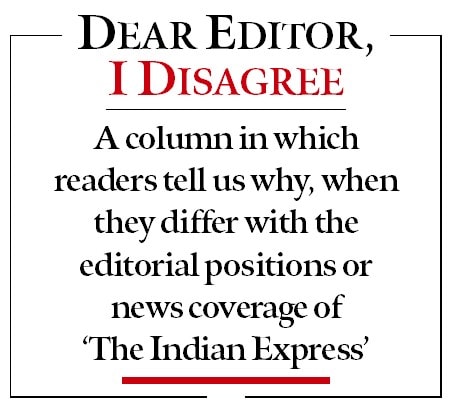Opinion Dear Editor, I disagree: I am a German citizen. Engaging with the far-right isn’t so simple
The biggest problem with progressive parties isn’t that they haven’t spoken to the right, it’s that they haven’t underlined their commitment to universal human rights.
 Leader of far right AfD Alice Weidel waves a German flag at the AfD party headquarters in Berlin, Germany, Sunday, Feb. 23, 2025, after the German national election. (Photo: AP)
Leader of far right AfD Alice Weidel waves a German flag at the AfD party headquarters in Berlin, Germany, Sunday, Feb. 23, 2025, after the German national election. (Photo: AP) I am a German citizen of Indian origin with undisputed left-liberal credentials. Given that the Express View on German elections and the rise of the far-right globally was the background behind your piece on how ‘liberals’ need to listen without having a meltdown, I think your advice was partially targeted at me. Perhaps you did not imagine a person of colour as a German and European by choice when you wrote this column. Neither do the far-right parties that you have defended. I particularly struggled with this piece because I cannot imagine holding a conversation with someone who disputes my identity – and my right – to call myself German and expects to strip me off my citizenship and re-emigrate/deport me. Please allow me to explain in detail why I find the Express View problematic.
The article is brought together by Giorgia Meloni’s argument that ‘the Left’ exposes its double standard when it dubs Trump, Meloni or Modi a threat to democracy and strives to keep them at arm’s length. The editorial conflates this amorphous Left with liberal politics in general although, in European countries, liberal mostly stands for neoliberal policies which the Left parties oppose, but far-right parties are generally in favour of. The editorial appears to deploy Indian disenchantments with (left-)liberal politics to analyse political developments elsewhere with little attention to the regional specificities. As the article concludes, the far-right holds multitudes and, for this reason, such comparisons must be undertaken with extreme caution. Meloni’s conflation of trends in North America, Europe or South Asia may work as pure political rhetoric, but does little to illuminate events such as the German federal elections.

At the broadest level, far-right parties across the world have one thing in common: they manufacture outsiders and hold them responsible for all the challenges their countries face. These parties are doing well world-over because communication is easier when you offer simple solutions for increasingly complex and entangled problems. The established political parties and actors can have a conversation with them only on their terms, that is, once the former have acknowledged that the simple solution – expelling the outsiders – holds currency.
Progressive parties such as the outgoing coalition in Germany may have foreclosed the possibility of a conversation – as the editorial mentions in a somewhat perplexed fashion – but they have actually listened and addressed these concerns during their tenure with visible reluctance – what is popularly dubbed in Germany as acquiescence with ‘stomach pain’. The conservative parties (CDU+CSU) have, on the other hand, enthusiastically appropriated the increasingly shrill anti-immigrant rhetoric and even cooperated with the Alternative for Germany (AfD) on passing a non-binding parliamentary resolution on the issue. The famed ‘firewall’ that had so far separated the established parties from those reminiscent of the country’s fascist past no longer exists in practice.
The editorial is perhaps accurate in its analysis that progressive politics lack agility and imagination. In their effort to work around immigration, which displaced economy as the top electoral issue in Germany, and bring focus back to their own agenda, the progressive parties have failed to underline their commitment to universal human rights that the anti-immigration politics positions itself against.
Their biggest problem is not that they have not listened to right-wing politicians, but rather that they have passively absorbed too much without articulating their position on the most pervasive political topic in Germany and Europe currently. While AfD’s electoral ascendance did not come as a surprise, Die Linke’s (The Left) last-minute surge underlines how articulate messaging on core democratic values still has resonance in western democracies. The Left in countries like Germany and France – the real one – has not only survived, but thrived.
What the political ascendance of the far-right in the West shows, in my opinion, is the need to offer comprehensive, compelling answers to the multiple crises ailing different nation-states. Yes, parties must improve their communication strategies and speak to the sections of the population that have gravitated to such parties in search of solutions. But opening channels of communication with people who fear for their future is not the same as conversing with political actors who cynically manipulate said fears and pose a threat to both people and democratic institutions.
The Express View appears to endorse Meloni’s view that far-right parties are unfairly labelled as threats to democracies. Such an argument sidesteps the fact that leaders such as Trump explicitly hold positions against the basic tenets of democracy, constitution and universal human rights. If the editorial’s contention is to accept the shifting definitions of democracy where those working to weaken and hollow out its provisions are not to be perceived as threats as such, the real challenge for left-liberals is to find ways to continue engaging people within the framework afforded by the constitution and the rule of law when their rivals explicitly refuse to.
Such a space is shrinking in western democracies not only for racial and ethnic minorities, but also for the progressive parties. The leaders of the Green Party, including the outgoing Vice Chancellor, have faced physical threats for pursuing policies they deem fit for the future of Germany and Europe. They may or may not have the right idea, but the idea of keeping communication channels open with political actors who advocate actual physical harm appears to be a naïve fantasy.
The writer is an anthropologist and author of Courting Desire: Litigating for Love in North India






